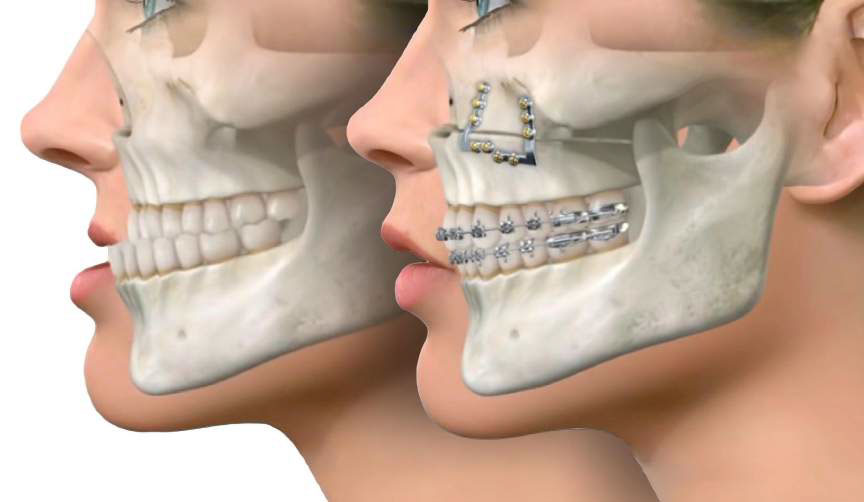Maxillofacial surgery plays a critical role in treating a wide range of conditions related to the face, mouth, jaw, and neck. If you are looking for a maxillofacial surgeon near you, it is important to understand the various treatments and solutions they provide, as well as the challenges you may face before, during, and after surgery. Whether you’re dealing with a traumatic injury, facial deformities, or need dental implants, maxillofacial surgery offers life-changing benefits.
Solutions in Maxillofacial Surgery
Maxillofacial surgery offers a variety of treatments designed to improve both the function and appearance of the face, mouth, and jaw. Below, we will discuss some of the common solutions provided by these specialists.
How Corrective Jaw Surgery Improves Facial Function and Aesthetics
One of the most important treatments available through maxillofacial surgery is corrective jaw surgery, also known as orthognathic surgery. This procedure is typically performed when the upper and lower jaws are misaligned. Such misalignment can cause difficulty with speaking, chewing, and even breathing. In addition, it can have a significant impact on a person’s facial appearance.
Corrective jaw surgery works to realign the jaws, improving their function and helping with the appearance of the face. This surgery can address issues like overbite, underbite, and other alignment problems, leading to better facial symmetry and improved self-confidence. This treatment is commonly performed in both teenagers and adults who experience jaw-related issues that cannot be fixed through traditional orthodontic treatment.
Dental Implants: A Long-Term Solution for Missing Teeth
Dental implants are another highly effective treatment provided by maxillofacial surgeons. Missing teeth can be caused by a variety of reasons, such as decay, injury, or disease. Dental implants are designed to replace missing teeth with artificial teeth that look and function like natural ones.
The implant procedure involves placing a metal post into the jawbone, which serves as a replacement for the root of a missing tooth. Over time, the bone fuses with the post, creating a secure foundation for a crown. This solution is beneficial for people who have lost teeth due to injury, illness, or other factors. Dental implants improve not only oral health but also facial aesthetics by filling in gaps left by missing teeth.
Treating TMJ Disorders for Better Jaw Health and Pain Relief
The temporomandibular joint (TMJ) is responsible for the movement of the jaw. TMJ disorders can cause pain, discomfort, and even difficulty when speaking or chewing. A maxillofacial surgeon can offer various treatments to help relieve the symptoms of TMJ disorders.
Treatment options may include medication, physical therapy, and in more severe cases, surgery. Surgery is often recommended when other methods fail to relieve the pain and improve the jaw’s function. By treating TMJ disorders effectively, maxillofacial surgeons help improve a patient’s quality of life, reducing pain and restoring the jaw’s normal function.
Common Problems Faced in Maxillofacial Surgery Near Me
While maxillofacial surgery can be highly beneficial, there are also some challenges that patients may face. Below are some of the most common problems patients encounter when considering maxillofacial surgery.
Delays in Surgical Recovery: What You Need to Know
Surgical recovery can take time, and this is especially true for maxillofacial surgeries. Whether you’re recovering from a corrective jaw surgery or dental implant placement, the healing process often involves swelling, discomfort, and the need for follow-up care.
Patients may experience temporary changes in their speech, ability to eat, or overall facial appearance. In some cases, the recovery process can be longer than expected, which can be frustrating. However, working closely with your maxillofacial surgeon and following post-surgery instructions is key to ensuring a smooth recovery. Managing expectations and understanding the recovery process upfront will help patients prepare mentally and physically for the healing journey.
Cost of Maxillofacial Surgery and Insurance Challenges
One of the biggest challenges that many patients face when considering maxillofacial surgery is the cost. Depending on the procedure, these surgeries can be expensive, and insurance coverage may vary. Some procedures, like corrective jaw surgery, may be covered by insurance if they are deemed medically necessary, while others, like dental implants, may not be fully covered.
It is important to consult with your insurance provider to understand what will be covered and whether additional costs will be incurred. Many maxillofacial surgeons offer payment plans or financing options, so be sure to inquire about these options if you are concerned about cost. Planning ahead and budgeting for the surgery can help alleviate some of the financial stress associated with these procedures.
Risks Involved with Oral Surgery and How to Minimize Them
Like any surgery, maxillofacial surgery carries some risks. These may include infection, bleeding, nerve damage, and complications related to anesthesia. However, the risks can be minimized by choosing an experienced maxillofacial surgeon and following all pre- and post-operative instructions carefully.
Before undergoing any surgery, patients should have a thorough consultation with their surgeon to discuss the risks and how they can be mitigated. It’s important to understand the full scope of the procedure and the necessary recovery steps in order to minimize potential complications.
The Role of Maxillofacial Surgery in Reconstructive Treatments
Maxillofacial surgery also plays a key role in reconstructive treatments. These treatments are designed to restore the function and appearance of the face and jaw following trauma or disease.
Restoring Facial Appearance After Trauma or Injury
Facial injuries can result in broken bones, cuts, and disfigurement. In some cases, maxillofacial surgery is necessary to repair these injuries and restore the face to its natural appearance. After traumatic injuries, such as car accidents or falls, maxillofacial surgeons can perform reconstructive surgeries to repair damaged tissue and bone. This helps patients regain both functionality and aesthetic appearance, improving their overall quality of life.
Cleft Lip and Palate Surgery: Transforming Lives for Children
Cleft lip and palate is a congenital condition where a baby is born with a split or opening in the upper lip or roof of the mouth. This condition can cause difficulty with feeding, speech, and hearing. Maxillofacial surgery can help correct these issues, often in multiple stages as the child grows.
Cleft lip and palate surgery is typically performed in infancy or early childhood, but it may require further surgeries as the child matures. These surgeries not only improve the child’s ability to speak, eat, and hear but also significantly enhance their facial appearance, which is crucial for emotional and social development.
Addressing Oral Cancer with Timely Maxillofacial Surgery
Oral cancer is a serious condition that can affect the lips, tongue, cheeks, and other parts of the mouth. When caught early, oral cancer can often be treated successfully with maxillofacial surgery. This may involve the removal of tumors, affected tissue, and lymph nodes.
Surgical intervention, combined with other treatments such as radiation or chemotherapy, can help patients recover and regain their oral function. Timely surgery is critical in ensuring that cancer does not spread and that the patient has the best chance of a full recovery.
How to Find the Right Maxillofacial Surgeon Near Me
Finding the right maxillofacial surgeon is essential to ensuring a successful surgery and recovery. Here are some things to consider when looking for a qualified surgeon:
What to Look for in a Maxillofacial Surgeon for Your Needs
The first step in finding the right surgeon is to ensure they have the appropriate qualifications. Board certification in oral and maxillofacial surgery is a must, as it demonstrates the surgeon’s expertise and experience. Additionally, look for a surgeon who has experience with the specific procedure you need, whether it’s corrective jaw surgery, dental implants, or another treatment.
The Importance of Specialized Care in Complex Facial Surgeries
Maxillofacial surgeries are often complex and require specialized care. Surgeons with experience in complex procedures, such as those for facial trauma or oral cancer, will have the skills necessary to perform the surgery safely and effectively. It’s important to choose a surgeon who specializes in the type of surgery you need.
Top Questions to Ask Before Scheduling Your Maxillofacial Surgery
Before scheduling surgery, make sure to ask the surgeon important questions, such as:
- What is the expected recovery time?
- What are the risks associated with this procedure?
- Will the surgery be covered by my insurance?
- How many times have you performed this specific surgery?
These questions will help you feel more confident in your decision and ensure you are well-prepared for the surgery.
Conclusion: The Benefits and Challenges of Maxillofacial Surgery Near Me
Maxillofacial surgery offers important solutions for a wide range of conditions related to the face, mouth, and jaw. From corrective jaw surgery to dental implants and oral cancer treatment, these surgeries can significantly improve a person’s quality of life. However, patients may encounter challenges, such as recovery time, cost, and surgical risks. By choosing a qualified maxillofacial surgeon and understanding the procedure, you can ensure the best outcome for your treatment. Maxillofacial surgery is an investment in both your health and appearance, making it an essential step toward improving your overall well-being.



